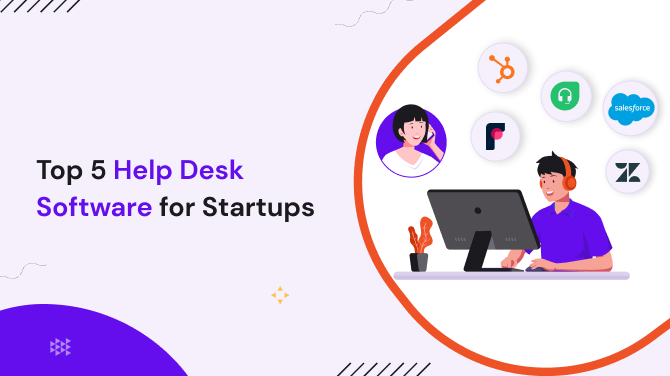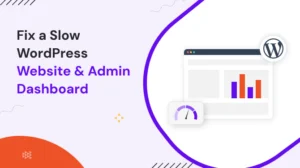As businesses continue to grow and expand their customer base, the need for efficient and effective customer support becomes paramount. Help desk software plays a crucial role in managing customer inquiries, resolving issues, and enhancing overall customer satisfaction. In this article, we will explore the top help desk software that businesses can consider to streamline their customer support operations. These software solutions have been carefully chosen based on their features, user-friendliness, customer reviews, and overall market reputation. So, let’s dive in and discover the leading help desk software options available.
What Actually Help Desk Software is?
The help desk software is a tool designed to streamline and manage customer support operations. It provides a centralized platform for businesses to handle customer inquiries, resolve issues, and provide timely assistance. Here is a brief list highlighting the key aspects and benefits of help desk software:
Ticket Management:
Help desk software allows businesses to create, track, and manage customer support tickets efficiently. Each ticket represents a customer inquiry or issue, ensuring that nothing falls through the cracks.
Multi-Channel Support:
Help desk software enables businesses to handle customer inquiries from various channels such as email, live chat, social media, and phone. This ensures that customers can reach out through their preferred communication method.
Automation and Workflow:
Help desk software automates repetitive tasks and workflows, saving time and increasing efficiency. It can automate ticket routing, prioritize urgent issues, and send automated responses to common inquiries.
Knowledge Base:
Help desk software often includes a knowledge base where businesses can create and store articles, FAQs, and guides. This self-service resource empowers customers to find answers to common questions independently.
Reporting and Analytics:
Help desk software provides insights into key metrics such as ticket volume, response times, customer satisfaction ratings, and agent performance. These analytics help businesses measure their support effectiveness and identify areas for improvement.
Collaboration Tools:
Help desk software facilitates collaboration among support agents by providing features like shared inboxes, internal notes, and task assignments. This ensures effective communication and cooperation within the support team.
Customer Relationship Management Integration:
Many help desk software solutions integrate with CRM systems, allowing businesses to access customer information, previous interactions, and purchase history. This integration helps agents provide personalized support.
Customer Satisfaction Surveys:
Help desk software often includes features for sending customer satisfaction surveys after resolving tickets. This feedback helps businesses gauge customer happiness and make necessary improvements.
Help desk software simplifies and streamlines customer support processes, leading to improved customer satisfaction, increased efficiency, and better team collaboration.
What are the benefits of using a help desk system?
A help desk system can greatly benefit your business in several ways. Here is a brief point-wise list highlighting the advantages:
Efficient Customer Support:
A help desk system provides a centralized platform to manage customer inquiries, ensuring timely and efficient responses. It helps organize and prioritize support tickets, ensuring that customer issues are addressed promptly.
Improved Customer Satisfaction:
By providing quick and effective support, a help desk system enhances customer satisfaction. It streamlines the support process, reduces response times, and enables personalized assistance, leading to happier customers.
Enhanced Productivity:
Help desk systems automate repetitive tasks, such as ticket routing and categorization, freeing up time for support agents to focus on more complex issues. This increases their productivity and allows them to handle a larger volume of tickets.
Knowledge Base and Self-Service:
Help desk systems often include a knowledge base where businesses can store FAQs, articles, and guides. This empowers customers to find answers to common questions on their own, reducing the number of support inquiries.
Reporting and Analytics:
Help desk systems provide valuable insights into support operations. They generate reports on key metrics such as ticket volume, response times, customer satisfaction, and agent performance, allowing businesses to identify trends, and areas for improvement, and make data-driven decisions.
Collaboration and Communication:
Help desk systems enable better collaboration among support teams. They provide features like shared inboxes, internal notes, and task assignments, ensuring smooth communication and coordination.
Scalability and Growth:
As your business expands, a help desk system can easily scale to accommodate increased customer inquiries and support operations. It grows with your business, providing a solid foundation for managing growing customer needs.
A help desk system improves customer support efficiency, enhances satisfaction, boosts productivity, enables self-service, provides valuable insights, fosters collaboration, and supports business growth. It is a valuable tool for businesses seeking to deliver exceptional customer support experiences.
1. Zendesk
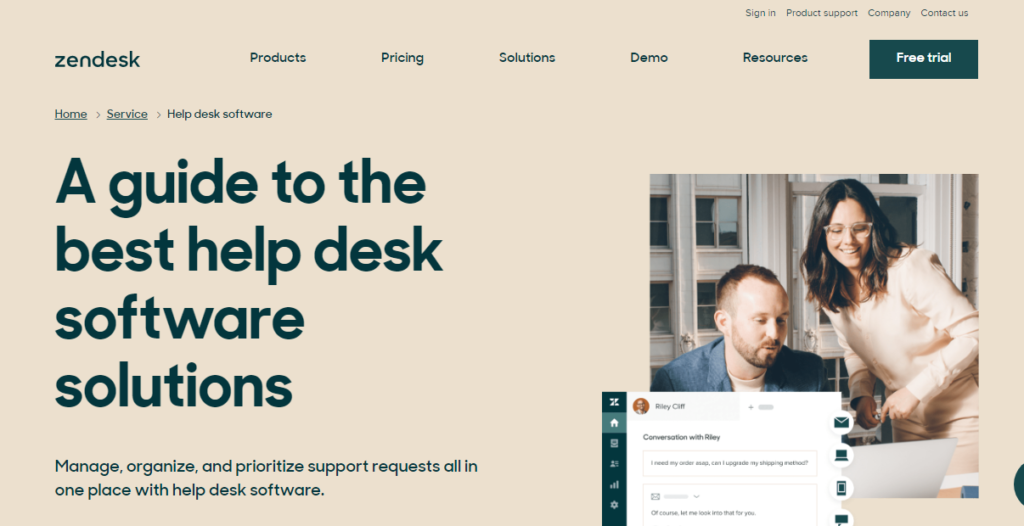
Zendesk Support Suite is a robust and comprehensive help desk software solution designed to make customer support a breeze. With this amazing tool, businesses can manage customer inquiries seamlessly across multiple channels like email, chat, social media, and phone, all from one convenient platform.
The robust ticketing system ensures that support agents can effortlessly track and resolve customer issues, providing timely assistance. What’s more, Zendesk Support Suite empowers customers by offering self-service options like a knowledge base and community forums, where they can find solutions on their own. It’s a game-changer for delivering exceptional support experiences and fostering customer satisfaction.
Pricing starts @ US$ 19 (It may vary)
2. HubSpot
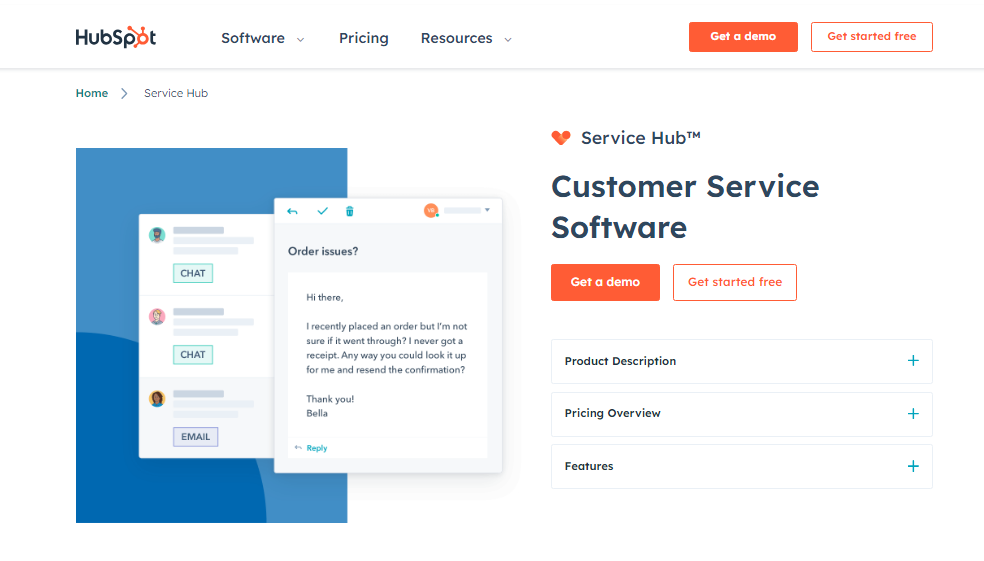
HubSpot Service Hub is an incredible all-in-one customer service software that goes above and beyond to simplify your support operations. With its suite of tools, you can seamlessly manage all customer interactions within a single platform. Say goodbye to scattered systems!
HubSpot Service Hub offers a shared inbox where you can effortlessly handle customer inquiries, a knowledge base for self-service support, and automation features that streamline ticket routing and resolution. Plus, it goes the extra mile by providing live chat functionality for real-time support. It’s like having a supercharged support team at your fingertips, ready to deliver exceptional customer experiences.
Pricing starts @ US$ 18 (Basic)
3. Freshdesk
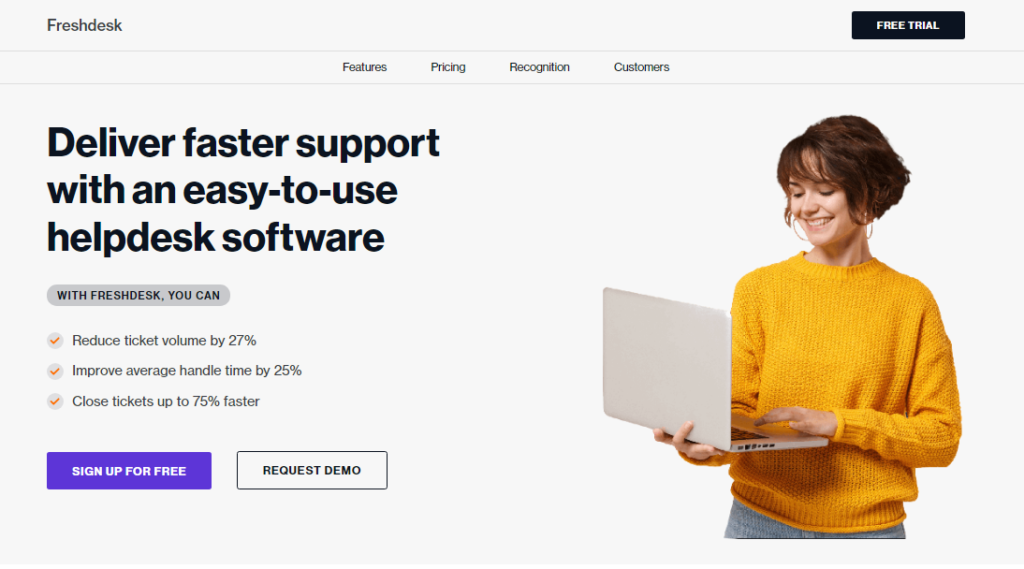
Freshdesk is a trusted and widely used help desk software that’s loved for its user-friendly interface and impressive capabilities. It’s designed to simplify your customer support workflows and make your life easier. With Freshdesk, you get a range of ticketing and collaboration tools that work harmoniously to streamline your support operations. Say goodbye to manual ticket assignment and escalation – Freshdesk automates it all, ensuring your valuable customers get swift responses.
It even offers a self-service portal where customers can find answers to common queries, empowering them to find solutions independently. Best of all, Freshdesk seamlessly integrates with various communication channels, allowing you to effortlessly manage customer interactions all in one place. It’s a game-changer for delivering top-notch support experiences!
Pricing starts at around $12.7
4. Salesforce
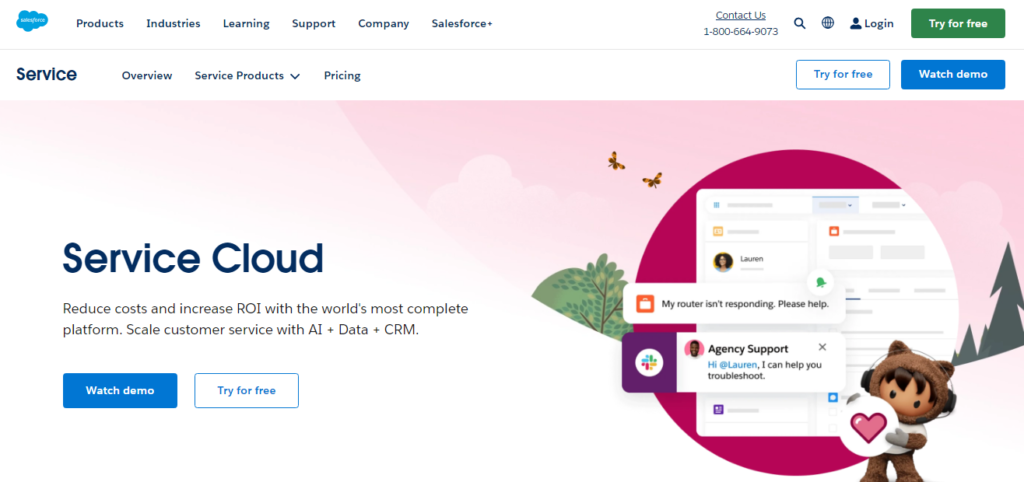
Salesforce Service Cloud is an exceptional customer service software solution that truly puts the power of personalized support in the hands of businesses. It goes above and beyond by offering a robust ticketing system, ensuring that support agents can efficiently handle customer inquiries with ease. What sets Salesforce Service Cloud apart is its ability to provide a complete 360-degree view of customer interactions.
Agents can access all the relevant information they need, enabling them to deliver tailored support that leaves a lasting impression. And that’s not all – Salesforce Service Cloud empowers customers by offering self-service options like a knowledge base and customer communities. This encourages customer empowerment and reduces the volume of support tickets, making life easier for both customers and agents. It’s a win-win solution for delivering exceptional support experiences.
Pricing starts at $25
5. Front
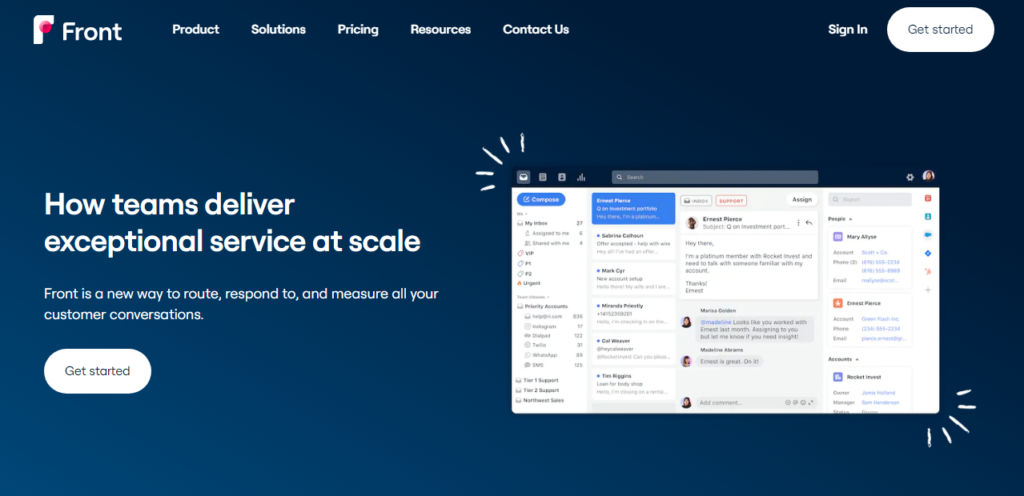
The Front is an incredible collaborative inbox software that revolutionizes the way teams manage customer inquiries. It’s like having a virtual command center where support agents can join forces and tackle customer messages with remarkable efficiency. With Front’s shared inbox, agents can collaborate seamlessly and respond to customer inquiries in real time, ensuring prompt and attentive support.
What’s even more impressive is its integration with various communication channels – email, social media, and chat. Now, businesses can effortlessly consolidate all customer interactions in one place, making it a breeze to stay organized. Front doesn’t stop there – it offers automation features like email routing and canned responses, taking response times to new heights and streamlining support workflows. It’s a game-changer for delivering top-notch customer experiences.
Pricing starts at $19
Conclusion:
In conclusion, selecting the right help desk software is essential for businesses aiming to provide exceptional customer support in 2023. The top 5 help desk software options discussed in this article, including Zendesk Support Suite, HubSpot Service Hub, Freshdesk, Salesforce Service Cloud, and Front, offer robust features and functionalities to streamline customer support operations.
FAQs
1: How can help desk software benefit businesses?
Help desk software provides businesses with a centralized platform to manage customer inquiries, streamline support workflows, and enhance overall customer satisfaction. It offers features such as ticket management, automation, self-service options, and reporting, enabling businesses to deliver efficient and effective customer support.
2: Are these help desk software solutions suitable for small businesses?
Yes, these help desk software solutions cater to businesses of all sizes. They offer scalable features and pricing plans, allowing small businesses to leverage their functionalities without breaking the bank.
3: Can help desk software integrate with other business tools?
Yes, most help desk software solutions offer integrations with popular business tools such as CRM systems, communication platforms, and project management software. This enables businesses to streamline their operations and improve collaboration across different teams.
4: Do these software solutions offer analytics and reporting capabilities?
Yes, help desk software solutions often provide analytics and reporting features. Businesses can gain insights into key metrics such as response times, ticket volumes, customer satisfaction ratings, and agent performance, allowing them to identify areas for improvement and make data-driven decisions.
5: How can businesses choose the right help desk software for their needs?
When selecting help desk software, businesses should consider factors such as their specific requirements, budget, scalability, user-friendliness, integrations, and customer reviews. It’s advisable to take advantage of free trials or demos to evaluate the software’s suitability before making a final decision.
Read other articles to get more insights:
